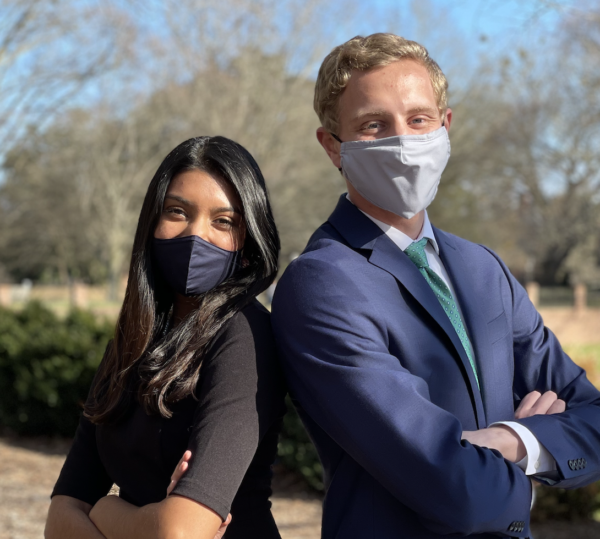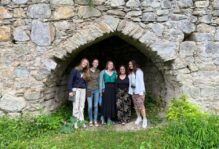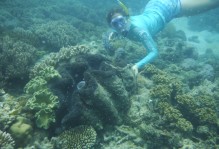The PIPS Process: Finding A Voice Through Research
By Nitya Labh ’22
When I first joined GRI’s Project on International Peace and Security (PIPS) as a Research Fellow, I had no idea what I wanted to study or whether I would produce research that mattered in the world. I think as an undergraduate, it’s hard for students to feel a sense of confidence or certainty in research because academia is still so new to us. But uncertainty has a great way of producing curiosity, and that’s where the PIPS research process begins.
The first semester of PIPS is all about brainstorming. Fellows are required to come up with at least three new project ideas per week to present to the PIPS team on Fridays. For the first few weeks, my project ideas fell flat. The topics were interesting, but not creative enough to “sparkle.” I think the hardest part of brainstorming is that it’s all about intellectual risk-taking—something that can’t always be taught in our classes. Ultimately, my project came from an idea I jokingly mentioned at a PIPS meeting: “If all those islands in the Pacific are ‘sinking,’ why doesn’t China build new ones?” That question “sparkled.”

PIPS Fellow Nitya Labh ’22 poses with Lucas Hauser ’23, the PIPS intern who provides support for her project. The students are researching “Geographic Revisionism: Chinese Land Reclamation and Ambitions in the Southwestern Pacific.”
From there, research “Phase Two” began. Phase Two is all about asking questions that challenge the viability of a project. Are artificial islands a realistic alternative for Pacific Island countries? Would China be willing to build-islands for others? If a project idea survives the Phase Two test, it’s time to outline the PIPS paper.
Around this time, PIPS Research Fellows are partnered with their Military Fellows—active duty military officers who mentor and advise students throughout their research projects. As I worked through the outline of my paper, I was able to meet with my Military Fellow, Major Kerg, to talk about US geostrategy in the Pacific. His experience and regional knowledge helped me better understand how to develop my project’s policy solutions section.
Winter break is a huge part of PIPS. Over break, Fellows are tasked with writing a full draft of their papers so that they can start editing them in the Spring semester. This period of time was my creative zone. Now that I had an exciting project idea, I read as many books as I could related to Chinese maritime strategy and international development. This reading informed my writing process and helped me dig deeper into the academic literature behind US-China competition. As an international relations student, having this time and space to explore geostrategic theory was extremely fulfilling.
Once the Spring semester began, the Fellows were assigned their research interns. Getting to work with my intern, Lucas Hauser ’23, has been my favorite part of the PIPS program by far. Interns help Fellows with their research, writing, and presentations as the PIPS projects enter their final phase. More importantly, the interns bring a new level of skill and creativity to the table. Their contributions bring out the best in their Fellows and projects.
In the spring, PIPS students also reach out to experts in fields related to their projects. These expert interviews help us develop and contextualize our research. I think this, of all moments, is when PIPS research touches the real world. For my project, I had the opportunity to speak with the former US Ambassador to the Pacific Islands and the Chief of Strategy at USINDOPACOM—a unified combatant command of the United States Armed Forces responsible for the Indo-Pacific region. They both talked to me about the importance of my research and how it fit into the larger framework of US national security.
As Lucas and I continued our expert interviews, we were offered a chance to write about our research for the Australian Defense Magazine. With the support of our professors, and after a few rounds of edits, our article Building Islands and Influence: Chinese Land Reclamation in the Southwest Pacific will be published.
As I reflect on our upcoming publication and finalize my research for the PIPS symposium, I think back to where it all began. At the start of the year I didn’t know what I wanted to study or whether I would produce research that mattered to the world. GRI and PIPS are all about bridging the gap between the theory and practice of international relations. This process—working with the Military Fellows, conducting expert interviews, writing for the defense community—is that bridge. Not only have I found my area of interest within International Relations, but more than ever I know that my work and my voice matter. The PIPS Fellows will present to the campus community virtually on April 27, 2021. Register online to watch.
Comments are currently closed. Comments are closed on all posts older than one year, and for those in our archive.




Hello
Is anyone can find current email for Professor Supdip Sen ? He was with the university about two years ago.
Thanks.
Dr. Shimizu